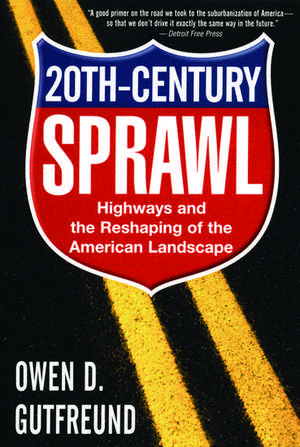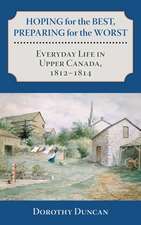Twentieth Century Sprawl: How Highways Transformed America
Owen D. Gutfreunden Limba Engleză Paperback – 13 oct 2005
Preț: 142.65 lei
Preț vechi: 155.45 lei
-8% Nou
Puncte Express: 214
Preț estimativ în valută:
27.30€ • 28.46$ • 22.69£
27.30€ • 28.46$ • 22.69£
Carte tipărită la comandă
Livrare economică 10-15 martie
Preluare comenzi: 021 569.72.76
Specificații
ISBN-13: 9780195189070
ISBN-10: 0195189078
Pagini: 320
Ilustrații: 38 halftones, 7 maps & 7 line illus.
Dimensiuni: 156 x 233 x 21 mm
Greutate: 0.45 kg
Editura: Oxford University Press
Colecția OUP USA
Locul publicării:New York, United States
ISBN-10: 0195189078
Pagini: 320
Ilustrații: 38 halftones, 7 maps & 7 line illus.
Dimensiuni: 156 x 233 x 21 mm
Greutate: 0.45 kg
Editura: Oxford University Press
Colecția OUP USA
Locul publicării:New York, United States
Recenzii
"Twentieth-Century Sprawl demonstrates convincingly how the financing of highways became a de facto national policy that subsidized growth on the urban periphery at the expense of older cities and inner-ring suburbs. We are living with the consequences of this policy today. A compellingly important book."--David Schuyler, Professor of American Studies, Franklin and Marshall College, and author of A City Transformed: Redevelopment, Race, and Suburbanization in Lancaster, Pennsylvania 1940-1980
"A good primer on the road we took to the suburbanization of America--so that we don't drive it exactly the same way in the future."--Detroit Free Press
"In the first thorough history of urban sprawl, Owen Gutfreund reveals how misguided government programs, business lobbying, and civic boosterism led to America's radically decentralized urban landscape and shows the high social and financial costs of subsidizing automobility. Twentieth-Century Sprawl will appeal to historians, planners, and policy-makers--and anyone who wants to understand how we wound up in the traffic-clogged mess we're in."--Clifton Hood, Professor of History, Hobart and William Smith Colleges, and author of 722 Miles: The Building of the Subways and How They Transformed New York
"In examining three disparate sites--in Colorado, Tennessee, and Vermont--Owen Gutfreund convincingly argues that the impact of the automobile goes beyond individual preferences and local needs. Rather, he shows that automobility has been driven by government policies at all levels with profoundly disturbing consequences. Bound to fuel further criticism and debate, Gutfreund's study deserves close consideration in any future policy debate over the course of metropolitan development."--Howard Gillette, Jr., Professor of History, Rutgers University-Camden, and author of Between Justice and Beauty: Race, Planning, and the Failure of Urban Policy in Washington, D.C.
"In Twentieth-Century Sprawl, Owen Gutfreund challenges prevailing myths equating highway construction with equity and choice to show how competition over finances, route ways, and political authority gave rise to cross-sectoral coalitions among advocates from rural roads, inter-metropolitan parkways, and a national system of primary motorways. Through a carefully selected set of case studies the author links policy with practice and we come to see our contemporary urban landscape anew, as the product of specialized knowledge, narrow definitions of the public good, and a surprising degree of ad hoc planning."--Greg Hise, School of Policy, Planning & Development, USC
"A good primer on the road we took to the suburbanization of America--so that we don't drive it exactly the same way in the future."--Detroit Free Press
"In the first thorough history of urban sprawl, Owen Gutfreund reveals how misguided government programs, business lobbying, and civic boosterism led to America's radically decentralized urban landscape and shows the high social and financial costs of subsidizing automobility. Twentieth-Century Sprawl will appeal to historians, planners, and policy-makers--and anyone who wants to understand how we wound up in the traffic-clogged mess we're in."--Clifton Hood, Professor of History, Hobart and William Smith Colleges, and author of 722 Miles: The Building of the Subways and How They Transformed New York
"In examining three disparate sites--in Colorado, Tennessee, and Vermont--Owen Gutfreund convincingly argues that the impact of the automobile goes beyond individual preferences and local needs. Rather, he shows that automobility has been driven by government policies at all levels with profoundly disturbing consequences. Bound to fuel further criticism and debate, Gutfreund's study deserves close consideration in any future policy debate over the course of metropolitan development."--Howard Gillette, Jr., Professor of History, Rutgers University-Camden, and author of Between Justice and Beauty: Race, Planning, and the Failure of Urban Policy in Washington, D.C.
"In Twentieth-Century Sprawl, Owen Gutfreund challenges prevailing myths equating highway construction with equity and choice to show how competition over finances, route ways, and political authority gave rise to cross-sectoral coalitions among advocates from rural roads, inter-metropolitan parkways, and a national system of primary motorways. Through a carefully selected set of case studies the author links policy with practice and we come to see our contemporary urban landscape anew, as the product of specialized knowledge, narrow definitions of the public good, and a surprising degree of ad hoc planning."--Greg Hise, School of Policy, Planning & Development, USC
Notă biografică
Owen Gutfreund teaches history at Barnard College and is Director of the Urban Studies Programs at Barnard and Columbia University.















